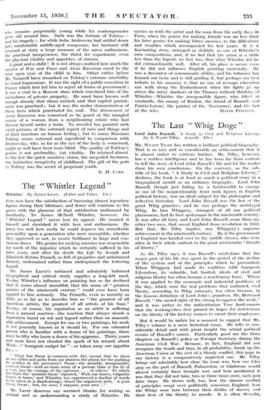The " Whistler Legend "
Whistler. By James Laver. (Faber and Faber. 15s.) Few men have the satisfaction of becoming almost legendary figures during their lifetimes, and fewer still continue to the grave with the glamour of that satisfaction undimmed by familiarity. To James McNeill Whistler, however, the " Whistler Legend " never lost its appeal. He created it himself and cherished it with love and enthusiasm. He knew too well how easily he could impress his remarkable personality upon a generation who were susceptible, whether they approved or not, to exotic brilliance in large and con- tinuous doses. His genius for making enemies was responsible for much of the injustice which he certainly suffered in his later years, and after his death the Life by Joseph and Elizabeth Robins Pennell, so full of prejudice and unbalanced flattery, undermined rather than underpinned the tottering legend.
Mr. James Laver's unbiased and admirably balanced biographical and critical study supplies a long-felt need. To-day Whistler's influence on painting has so far declined that it seems almost incredible that the name of " greatest painter of the nineteenth century" could ever have been applied to him seriously. The Pennells, even as recently as 1924, go so far as to describe him as " the greatest of all American artists, the greatest of all artists of his time." To-day, of course, his reputation as an artist is suffering from a natural reaction—the reaction that always clouds a reputation based on wit and legend rather than on unassail- able achievement. Except for one or two paintings, his work is not generally known as it should be. For one educated person who is familiar with a dozen of his paintings, there must be fifty who know a dozen of his epigrams. Thirty years and more have not clouded the spark of his remark about Wilde--" bourgeois malgre lui "—or taken away our appetite for ;— " ' What has Oscar in common with Art, except that he dines at our tables and picks from our platters the plums for the pudding ho peddles in the provinces ? Oscar—the amiable, irresponsible, eminent Oscar—with no more sense of a picture than of the fit of a coat, has the courage of the opinions . . . of others.' To which Site flight the' amiable Oscar ' riposted, With our James, vulgarity begins at home,' and Whistler, too experienced a duelist of words to be taken at a disadvantage, closed the argument with, A poor thing, Oscar ; but, for once,' I suppose, your own '. "
Mr. Laver deserves our warmest thanks for writing so critical and so .understanding -a study. of Whistler. He
Carries us with the artist and the man from the early days in Paris, when his genius for making friends was no less than his later genius for making bitter enemies, to the difficulties and troubles which accompanied his last years. It is a fascinating story, arranged as skilfully as one of Whistler's own compositions, and, if we feel that the artist is a little less than the legend, we feel, too, that what Whistler did he did extraordinarily well. After all, his place is secure even if he did not influence English painting materially. lie was a decorator of consummate ability, and his influence has formed our taste and is still guiding it, but perhaps our best tribute to his memory is that no one of average education can walk along the Embankment when the lights go up above the misty shadows of the Thames without thinking of Whistler—Whistler the irresponsible figure, who tilted at windmills, the enemy of Ruskin, the friend of Rossetti and Fantin-Latour, the painter of the Nocturnes', and tlic last








































 Previous page
Previous page